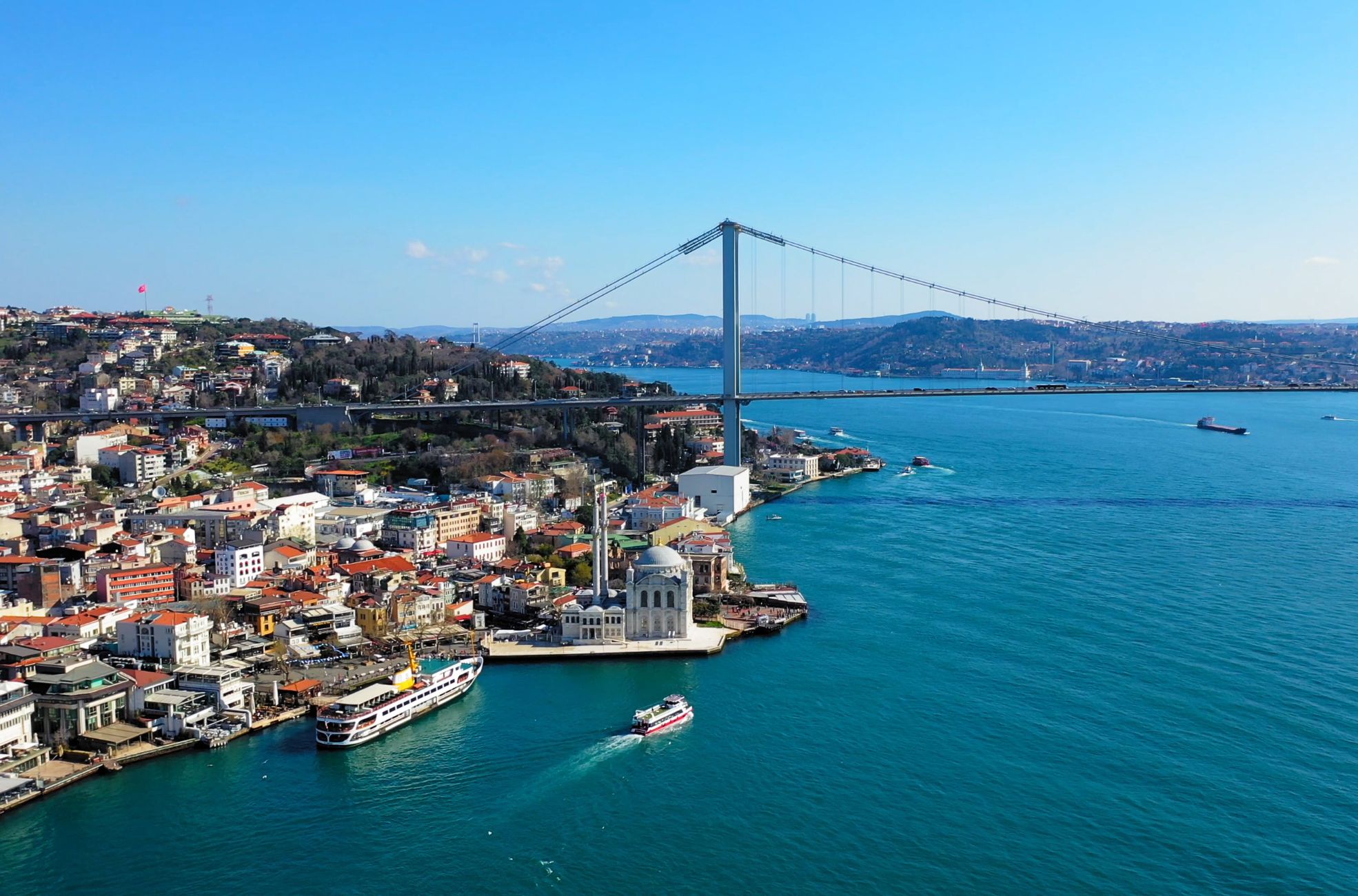Buying property in Turkey has become a popular investment for foreign nationals, drawn by the country’s strategic location, rich culture, and attractive real estate market. Offering more than just a picturesque setting, Turkey provides a unique opportunity for investors to acquire property and obtain citizenship through its Golden Visa policy.
With a real estate landscape that caters to a wide range of preferences, from the vibrant city life of Istanbul to the tranquil seaside towns along the Mediterranean, Turkey is an enticing option for those looking to expand their portfolio or find a new home abroad.
This guide aims to equip potential investors with essential insights into the Turkish property market, including prime locations, average costs, legal procedures, and new regulations introduced in 2023, ensuring a well-informed decision-making process.
The Turkish Property Market
Turkey’s allure for expatriates and investors isn’t just in its rich culture and strategic location but also in its welcoming real estate market. The country has become a magnet for foreign investment, especially for those looking to acquire property as a pathway to citizenship.
With a minimum investment of $250,000 in real estate, you can become eligible for Turkish citizenship, a policy that significantly boosted the country’s appeal. This Golden Visa policy, coupled with the global recognition of the Turkish visa, makes the prospect of investing in Turkey’s diverse and expansive property market even more enticing.
Prime Locations for Real Estate in Turkey
When you’re considering property investment in Turkey, location is key. The Turkish real estate landscape offers a variety of prime locations that cater to different preferences, whether you’re seeking the vibrancy of city life or the tranquility of coastal retreats. Istanbul stands out as the commercial heart of Turkey, boasting a robust economy and a rich cultural scene.
Its strategic position as a global hub, with over 55 countries within a four-hour flight radius, adds to its desirability for investors. The city’s real estate market is diverse, offering everything from luxury apartments to commercial properties. With its ongoing modernization plans, Istanbul is poised for further growth.
Other notable locations include Antalya, a tourist favorite with its Mediterranean charm, and Bursa, which mirrors Istanbul’s economic prosperity. With its lower property prices and tourist landmarks, Kusadasi offers a cost-effective entry into the market. Bodrum is renowned for its architectural elegance. Alanya has become increasingly popular due to its affordable real estate options and significant development over the past decade.
The southwestern coastlines, with their scenic beauty and expat-friendly communities, attract a diverse international crowd, with areas like Fethiye and the Bodrum peninsula’s Yalikavak becoming hotspots for luxury living and investment.
What Is The Average House Cost In Turkey?
The cost of housing in Turkey is relatively attractive compared to other European countries, which is one of the reasons for the high volume of residential property sales to foreigners.
In 2019, Turkey saw a staggering 45,483 residential properties sold to international buyers, a trend that has continued to grow. TurkStat reported that in 2022, 67,490 properties were sold to foreigners, with Istanbul, Antalya, and Mersin being the most favored provinces.
The average cost of a house in Turkey varies widely depending on the location and type of property. For instance, the Mediterranean coastal villages, known for their luxury offerings, command higher prices. In contrast, areas with prominent British expat communities offer some of the lowest property prices in the country.
The house price index indicates a significant year-over-year growth, with prices increasing by 32.39% in April 2021. However, the overall residential sales declined by 21.4% in 2021 compared to 2019, reflecting a competitive market environment.
You’ll need to consider the cost of purchasing and maintaining the property, making sure the purchase price is within budget and that maintenance costs stay low for a high return on investment. It’s also crucial to verify the validity of the title deed, ensure all taxes are paid, and confirm that the property is registered with local authorities with no outstanding debts.
If you’re planning to rent out your property, choosing a location with high rental demand and ensuring the property has modern facilities and good security measures is key to attracting tenants. With its favorable conditions and strategic locations, the Turkish property market presents a golden opportunity for expatriates looking to invest in real estate and gain citizenship. However, due to the complexities and nuances of the market, it’s highly recommended to seek professional real estate expert guidance and legal advice before making any significant investment decisions.

Legal Procedures for Buying Property in Turkey
Necessary Documents for Foreign Buyers
Several key documents are required to ensure a smooth property acquisition. Tapu is essential for establishing ownership. Foreign buyers must also present a notarized and translated passport to obtain it.
A Turkish tax number is necessary for financial transactions. It can be obtained swiftly either online or at a tax office with your passport. This number is also required to set up a bank account in Turkey, which is essential for transferring funds for the property purchase. Additionally, proof of address, such as a utility bill from your home country, is needed to open a bank account.
Recent regulations mandate that property payments be made in Turkish Lira, necessitating currency exchange at a Turkish bank and obtaining a Foreign Exchange Document for the Land Registry Office. An appraisal report determining the property’s official value is required before the title deed transfer.
For the title deed application, biometric photos are also necessary.
Overview of the Conveyancing Process in Turkey
The conveyancing process permits foreigners to purchase property in urban areas, provided it is not within military zones or rural regions. The process involves settling fees, including the title deed charge and agent commission, typically around 4% of the property’s value each.
Once the financial aspects are addressed, the title deed can be transferred, confirming ownership. It is important to note that property ownership alone does not grant work or residency rights. However, a minimum investment of $400,000 can make one eligible for the Turkish Citizenship by Investment Program.
Obtaining a Foreigner Identification Number
Early in the property acquisition process, expatriates must obtain a Foreigner Identification Number from the TNP Foreigners’ Department. This number is essential for legal transactions, including property purchases.
Land Register and Cadastre Information
The Land Register and Cadastre maintain the official records of property ownership. Here, the Tapu is registered, finalizing the property acquisition. This registration is crucial for those seeking citizenship through investment, which requires maintaining the investment for a minimum of three years. This pathway offers the potential for citizenship, residency, and access to numerous countries without a visa or visa-on-arrival.
Furthermore, this citizenship can be extended to immediate family members, enhancing access to various markets.
How long can you stay in Turkey if you own a property?
Property owners in Turkey and their immediate family members are eligible for renewable residence permits, allowing them to reside in the country for as long as they retain ownership of their property.
Obtaining Citizenship Through A Real Estate Investment in Turkey
Investing a minimum of $400,000 in Turkish real estate and agreeing to retain the property for no less than three years can initiate the citizenship application process. This investment threshold is stipulated by the Citizenship by Investment Program, which aims to provide a streamlined and effective procedure, typically concluding within 120 days after all necessary documentation is in order.
The process begins with acquiring a Certificate of Eligibility, which involves opening a local bank account and obtaining a Turkish Tax ID Number. Following this, you must apply for a residence permit and make the property investment. The final step involves submitting your citizenship application to the Ministry of Interior at one of their district offices.
The real estate market in Turkey offers a range of properties, including luxury apartments, villas, and commercial spaces. The market is not only accessible online but is also projected to appreciate in value, presenting an attractive investment opportunity. The cost of living in Turkey is also lower than in many EU countries and the US, which is appealing to expatriates.
Citizenship provides visa-free or visa-on-arrival access to 110 countries and eligibility for the E-2 Investor Visa in the US. Turkey permits dual citizenship, allowing you to retain your original nationality.
While the government has facilitated foreign investment in the property market, certain restrictions apply, such as the prohibition on foreign ownership in military zones and a limit on the amount of land that can be owned. Nonetheless, foreign property owners enjoy robust rights protection, including inheritance.
With property values experiencing annual increases and the affordability of properties in major cities, the investment potential is significant.

What are the new rules for buying property in Turkey in 2023?
Suppose you’re an expatriate eyeing Turkey as a spot for investment, especially in real estate. In that case, keeping up with the latest regulations is important. In 2023, Turkey rolled out new rules that significantly affect the property buying process, particularly for those looking to snag residency or citizenship through their investment.
One of the biggest changes is the hike in property valuation requirements. The minimum property value to secure a residence permit used to be $50,000, which went up to $75,000 in big cities like Istanbul, Antalya, and Ankara. But these numbers have jumped even more. As of October 16, 2023, you’ll need a property with a market value of $200,000 to get a residence permit by investment in any Turkish city.
The bar is set even higher for those chasing citizenship through real estate investment. You’ll need a property valued at a market price of $400,000. This means the TAPU, Turkey’s official title deed, must show the property price at or above these amounts. Plus, the payment slip from the Central Bank must match or exceed this value. This one-size-fits-all valuation requirement now spans all cities, which could shake up investment in smaller cities or rural areas where property values might have been below the new threshold.
The process has gotten easier since you don’t need a separate valuation report under the new rules. This is good news for potential buyers wading through the complexities of buying property abroad.
For residency based on a $200,000 property investment, you’ll need to stay in the country continuously for five years. For citizenship, you must invest at least $400,000 in real estate. The citizenship application process can take from three to six months, depending on how quickly the government works through its due diligence and processing.
Keep in mind that if you snagged a residence permit based on real estate investments before the cutoff on October 16, 2023, you’re not affected by the new valuation requirements for renewals. But suppose you sell your property and buy another. In that case, the new $200,000 valuation rule kicks in, regardless of location or whether it’s a transfer, renewal, or a first-time application.
The changes to Immigration Law No. 6458, Article No: 31-1, have also tweaked the Turkish Golden Visa program. The minimum investment in residential and commercial real estate for Turkish citizenship is $400,000.
Also, you can only extend tourist residence permits for holiday reasons. You’ll need other valid reasons to stay, like work, study, business, real estate, treatment, etc. This doesn’t apply to citizens from the European Union, Russia, and China, though.
These updates affect both short-term and long-term residence permits. And remember, having a health insurance policy that meets certain criteria is still a key document for getting a residence permit in Turkey.
The increased valuation requirements might put off some expats on tighter budgets from investing in Turkish property. But you can meet the new thresholds. In that case, the chance to secure residency or citizenship through real estate investment is still there, just with a higher starting point.
FAQ’s
Which city in Turkey is the best to buy a house?
The ideal city for purchasing a house in Turkey aligns with your personal preferences and investment goals. Its economic significance and diverse property types make Istanbul a prime choice. Antalya is another attractive location known for its dynamic environment and lifestyle variety. Bursa is attracting a more affluent population due to its economic growth. For those interested in a relaxed coastal life and yachting, Bodrum could be ideal. Kusadasi is preferred for its appeal to tourists.
Does buying a house in Turkey give you residency?
Purchasing property in Turkey can pave the way to residency. Investing a specified amount in Turkish real estate may qualify for citizenship, including a globally recognized visa. This investment enables you to obtain an e-kimlik and a Turkish passport.
The citizenship application is expedited, often taking about 3 to 6 months for approval. A tourist visa can also be converted into a short-term residence permit, which offers visa-free travel to numerous countries.
Can a US citizen buy a house in Turkey?
US citizens are permitted to purchase houses in Turkey. The Turkish Citizenship Law 5901 accommodates dual citizenship, which is accessible to Americans and individuals from many other nations. The process for Americans is uncomplicated, and with the necessary real estate investment, they can initiate the citizenship application.
This procedure is typically finalized within 1 to 1.5 years.
Is buying property in Turkey risky?
Purchasing property in Turkey entails certain risks, as does any international real estate investment. However, the market has shown a positive trend, with anticipated future growth. Since 2005, there has been a notable influx of land and property investments by foreigners, reflecting a robust interest in the market. It is advisable to consult with real estate experts and legal advisors to optimize outcomes and mitigate risks.
Which city in Turkey has the cheapest property?
Alanya is recognized for its more economical property prices. The city has seen considerable growth, drawing investors seeking value. Alanya presents a range of property types, from budget-friendly apartments to upscale homes.
Other regions may also offer competitive prices, but it’s essential to research and compare different locations to find the best value that aligns with your financial plan and investment goals.
Your Gateway to New Beginnings
Turkey’s real estate market presents a vibrant landscape for expatriates considering investment or settling down in this transcontinental gem. With favorable property prices and an inviting Citizenship by Investment program, the prospects are as rich as the culture you’ll immerse yourself in.
Whether you’re lured by the bustling metropolis of Istanbul or the serene coastlines of Bodrum, each city offers unique opportunities to fulfill your lifestyle aspirations while making a strategic financial move. Remember, navigating the Turkish property arena requires due diligence, awareness of the latest regulations, and, often, guidance from experienced professionals.
Embracing this beautiful country through property acquisition could be your next big adventure or the wisest investment decision. With careful planning and insight, your journey toward residency or citizenship can be as seamless and rewarding as the Turkish experience.





